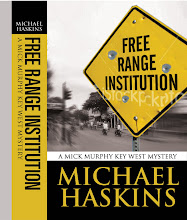James Lincoln Warren, the mastermind behind the ever popular "Criminal Brief Blog," and short story writer, asked me to be a guest blogger for Saturday, Sept. 29th. I was honored. This is one blog I check and read daily. There is a link to the right, so if you are not a reader of Criminal Brief check it out. The following is what I wrote.
My love affair with the short story began in high school English class. Hemingway’s Nick Adams stories drove me to the library’s “books-for-sale” room. I even remember the book I bought, Hemingway’s “Men Without Women.” I soon followed it with “In Our Time.” Today, my home office shelves overflow with books, including many short story collections.
I believe the short story is the foundation of the writer’s craft. The discipline it takes to write one, to get setting, dialogue, and action to the barebones without losing the nucleus of the story is, as the publishing world once appreciated, the writers’ incubator.
I have read that the short story is considered close to its demise. The weekly and monthly magazines that flourished in the past have dwindled and the markets that once paid handsomely to publish new writers are almost extinct, unfortunately.
There is hope for us. Dell’s EQMM and AHMM monthly editions feature many of today’s most talented writers. The publications have risen to take the place of pulp fiction magazines of the ‘30s, ‘40s, ‘50s, and ‘60s, where Raymond Chandler, Dashiell Hammett, Talmage Powell, Carroll John Daly, and others first appeared. Their stories thrilled readers of the Dime Detective, Dime Mystery, Detective Tales, Ten Detective Aces, and G-Men Detective.
It is obvious that short stories and crime fiction have always shared a bond with readers and it continues today.
Other positive signs of life for the modern short story include the many regional noir-themed books that have begun to appear and are edited and written by writers from as far away as Dublin and as close as Los Angeles and New York. These noir editions may have an unusual affect on the novelists who submitted stories; could they become closeted short story addicts? Will we see more short works form them? One can only imagine.
We know anthologies are not moneymakers, because publishers tell us. So why do these writers write, if not for the paycheck? Have they discovered the euphoria of taking a complicated plot and whittling it down to twenty or less pages without losing its essence? Have they experienced the satisfaction behind mastering the challenge to make a character stand by his or herself, without an entourage? It is something to think about.
Boston mystery writer Jeremiah Healy, a prolific short story writer and novelist, asked me once what I was doing, after I had finished the final draft of my novel.
“Writing a short story,” I said and he replied, “Atta boy!”
Years ago, Dennis Lynds told me at an MWA So.Cal social that if I could master the short story, I could write anything. Dennis’ writing talents go unchallenged.
You would think, in a society craving instant gratification in everything from food to medicine, the short story would satisfy the public’s thirst for innovative fiction. As long as publishers refuse to promote story collections like the noir series, Dennis Lehane’s “Coronado,” James Lee Burke’s “Jesus Out to Sea,” or Laurence Block’s “Enough Rope,” the public will remain cheated out of the opportunity to read writing at its best.
There will never be a shortage of writers to tackle the risk of the short story; those of us who love succinctness in storytelling, and want to prove our worth with pen and ink, will always write. It is our passion and, sometimes, our curse.
With the number of Internet magazines and blogs coming online today, our stories now reach enthusiastic audiences from around the world; the rumored demise of our art has retreated into the shadows – to wither and die, hopefully.
Writers write and the desire to be published is only one of the driving forces. Another, the one we find hard to explain, is that we must write. People understand a paycheck, but when we write early in the morning or late at night, when we cloister ourselves in front of the computer without a paycheck in sight, friends and family begin to wonder about our sanity.
Try telling them it’s a love affair with language and story . . . on the other hand, tell them you believe in Leprechauns or have a Muse and maybe they’ll leave you alone, so you can do what you love. It works for me, but, hey, Key West is my Muse, and most everyone here believes in what others find unbelievable.
Sunday, September 30, 2007
Subscribe to:
Post Comments (Atom)

















No comments:
Post a Comment